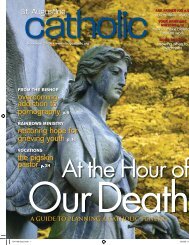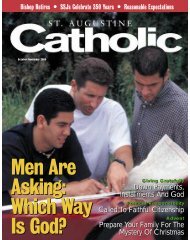This Lent Discover God's Love In A Retreat - St. Augustine Catholic
This Lent Discover God's Love In A Retreat - St. Augustine Catholic
This Lent Discover God's Love In A Retreat - St. Augustine Catholic
Create successful ePaper yourself
Turn your PDF publications into a flip-book with our unique Google optimized e-Paper software.
words, redeemed people must act like<br />
redeemed people.<br />
So, we not only need to forgive<br />
ourselves for our failures at loving, we<br />
should resolve to do more, to develop a<br />
new attitude, to change our behavior.<br />
How can we forgive others? On the<br />
cross, having been tortured, taunted and<br />
humiliated, Jesus says: “Father, forgive<br />
them, for they know not what they do.”<br />
What about us? How like his is our<br />
forgiveness of others?<br />
We could be consumed with anger and<br />
hatred toward someone who has wronged<br />
us. Understandable? Yes, certainly. But<br />
Christian? Certainly not!<br />
When we want those who wrong us to<br />
“pay” for what they’ve done, we should<br />
instead leave that person to God. Jesus set<br />
the example. He forgave those who killed<br />
him. He calls us to “Let go and let God.”<br />
One of Jesus’ sayings has to do with<br />
how often we should forgive. His disciples<br />
ask him, “Tell us teacher, how often<br />
should we forgive others: seven times?”<br />
Now for the Jews, “seven” represented the<br />
perfect number.<br />
So, Jesus followers thought they were<br />
really doing something special or being<br />
heroic by forgiving seven times. Yet, Jesus<br />
responds to his followers – then and now<br />
– in this way: “I say to you, you must<br />
forgive seventy times seven times!” And<br />
Jesus didn’t mean 490 times. He meant we<br />
must forgive an infinite number of times.<br />
If we wish to be forgiven, we may be called<br />
to forgive, every day of our lives.<br />
And we should learn to “forgive” God.<br />
At first, the idea of forgiving God may<br />
seem strange, perhaps even somewhat<br />
blasphemous.<br />
But the idea isn’t new. There’s a whole<br />
series of “complaint literature” in the Bible<br />
where, for example, the psalmists complain<br />
to God about his silence, his seeming nonaction<br />
on their behalf in the midst of<br />
adversity. Over and over again the<br />
psalmists ask God, “How long, O Lord,<br />
how long, must we wait?” and “Why, O<br />
God, why do you let our enemies<br />
overcome us?” The book of Job is a<br />
powerful and moving response to the<br />
question, “Why do good people suffer?”<br />
The Book of Job tells us, “People are born<br />
to trouble as surely as the sparks fly<br />
upward.” Trouble isn’t a gate-crasher. It has<br />
a passkey to every home in the land.<br />
Rabbi Harold S. Kushner wrote his<br />
best-selling book, When Bad Things<br />
Happen to Good People, at a time when he<br />
had to redefine his concept of God<br />
because his young son was afflicted with<br />
the horribly painful and fatal disease,<br />
progeria, the aging disease. He writes:<br />
“The conventional explanation, that<br />
God sends us a burden because he knows<br />
that we are strong enough to handle it, has<br />
We sin by<br />
omission when<br />
we could have<br />
responded in<br />
love and did not.<br />
it all wrong. Life, not God, sends us the<br />
problem. When we try to deal with it we<br />
find out that we are not strong. We are<br />
weak; we get tired; we get angry, overwhelmed.<br />
We begin to wonder how we<br />
will ever make it through all the years. But<br />
when we reach the limits of our own<br />
strength and courage, something unexpected<br />
happens. We find reinforcement<br />
coming from a source outside of ourselves.<br />
And in the knowledge that we are not<br />
alone, that God is on our side, we manage<br />
to go on.”<br />
But who is this God who is on our side?<br />
Whether we’ve reflected on it or not, all of<br />
us have some kind of image of God.<br />
For some God is a “divine judge” who<br />
rules every aspect of our lives.<br />
For others, God is the “divine Santa<br />
Claus” who gives us everything we pray for.<br />
But, I believe, most of us would like<br />
God to be a “divine Superman,” that is,<br />
a God who saves us in the “nick of time,”<br />
who sees that nothing terrible happens<br />
to us.<br />
However, the “image” of God that Jesus<br />
gave us is God as a loving parent who, just<br />
like a loving human parent, can’t always<br />
shelter us from life with its pain and<br />
suffering, but who is there with us and for<br />
us and even suffers along with us.<br />
At the end of his book, with a new<br />
image of God, Kushner writes, “<strong>In</strong> the<br />
final analysis, the question of why bad<br />
things happen to good people translates<br />
itself into some very different questions.”<br />
For example: Are you capable of<br />
forgiving and accepting a world that is not<br />
perfect, a world in which there is<br />
unfairness and cruelty, disease and crime,<br />
earthquakes and accidents? Can you<br />
forgive the world’s imperfections and love<br />
it because it’s capable of containing great<br />
beauty and goodness, and because it’s the<br />
only world we have?<br />
Are you capable of forgiving and loving<br />
the people around you, even if they’ve hurt<br />
you and let you down by not being<br />
perfect? Can you forgive them, and love<br />
them, anyway, because there aren’t any<br />
perfect people around?<br />
And so, are you capable of loving and<br />
forgiving God, as Job did, despite the bad<br />
things that may happen to you?<br />
And if you can do these things, will you<br />
be able to recognize that the ability to<br />
forgive and the ability to love are the<br />
powers God has given us to enable us to<br />
live fully, bravely, and meaningfully in this<br />
less than perfect world? Let us pray that<br />
each of us can.<br />
Father Cletus M.S. Watson, TOR, is pastor<br />
of Crucifixion Parish in Jacksonville. He also<br />
is the author of two booklets: “The Concept<br />
of God, and the Afro-American” and “<strong>Love</strong><br />
and the Human Person: An ongoing<br />
Perspective.”<br />
ST. AUGUSTINE CATHOLIC • FEBRUARY/MARCH 2001 7

















